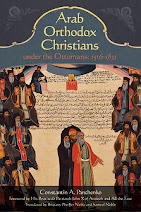Arabic original here.
ISIS Requires Syria’s Christians to Live according to the
Decrees of Islamic Law and will Take Over Churches Built after Islam
by Paula Astih
After the decline of the Free Syrian Army’s influence to its
lowest level since the outbreak of the Syrian crisis more than two and a half
years ago and the domination of Islamists, specifically Jabhat al-Nusra and the
Islamic State in Iraq and Syria (ISIS) over the majority of the regions under
the influence of the Syrian opposition, these groups effectively began to apply
Islamic law through shari’a courts. The latest announcement made by ISIS in
this regard is its requiring women in some areas of Aleppo and its outskirts to
wear the hijab required by shari’a, “if not, the woman and her guardian will be
subjected to a trial according to shari’a.”
Despite the recent
announcement by Jabhat al-Nusra through its leader Muhammad al-Julani that they
do not declare individuals and groups to be infidels, but rather, just like
ISIS, it is planning for the Syria of the future governed by Islamic law, this
has placed more than a question mark over the fate of the approximately one
million and a half Syrian Christians, a large proportion of whom remain in
their regions while the rest are eager to return as soon as possible.
As for the Islamists’ relationship with Christians, Abu
Abdallah, an ISIS field commander currently in Aleppo, spoke with el-Nashra,
denying that the Christians are their enemies. He said, “We do not attack
anyone unless they attack us. We have previously taken over Christian regions
in Syria and Iraq and we did not harm anyone unless it was proven to us that
they did harm to or killed Muslims. Islam did not make the People of the Book a
target for Muslims that we might treat them with enmity unless they oppress us, like America and the Zionists did
in Palestine, Iraq and Afghanistan.
Abu Abdallah stressed that ISIS has no intention to expel Christians
from Syria, pointing out that they did not do this in Iraq and will not do this
now in Syria, “However, they must live according to the decrees of Islamic law
as it pertains to the People of the Book. Namely, God forbade the building of
churches after Islam and so we will not permit churches to be built nor crosses
to be erected. Those who want to practice their religion, let them practice it
at home and take their freedom in this.”
As to the fate of churches in Syria, he indicated that “We
will do no harm to those built before Islam, but any church, monastery or the
like that was built after Islam entered Syria, we will turn it into something
that the worshippers of God will benefit from.”
“Christians in the Syria of the future will be citizens like
everyone else,” Abu Abdallah says, while emphasizing at the same time that they
will play no political role. “No one will govern Syria other than its emir and
caliph who will be chosen by the Muslims. There will be no political parties
and no forms of western pseudo-democracy. We will govern according to God’s
Book and the tradition of His Prophet.”
Abu Abdallah did not deny that ISIS has attacked Christian
places of worship, on account of their being “churches and crosses that were
built and erected after Islam entered into Syria and spread there. This is why
we changed them into headquarters that the worshipers of God will benefit
from, such as the Church of the Armenian Martyrs in Raqqa, which was built
after Islam and which the Christians never had a right to.”
Abu Abdallah stated that ISIS had nothing to do with the abduction
of the nuns of Maaloula, pointing out that it does not have units in that
region and denying any knowledge of their fate.
ISIS is making a specific effort to take over villages and
regions along the border and some of its units are currently found in a number
of such locations, especially those adjacent to the border with Turkey in
Raqqa, the outskirts of Deir ez-Zor, some neighborhoods of Aleppo such as
Bustan el-Qasr, in the northern and western outskirts of Aleppo, in the
northern outskirts of Lattakia, and some of the villages around Dera and the
outskirts of Damascus. They are likewise concentrated in the Idlib countryside,
in the cities of Sarmada, Dana, and Hazano.








No comments:
Post a Comment